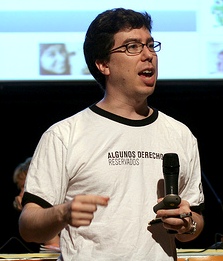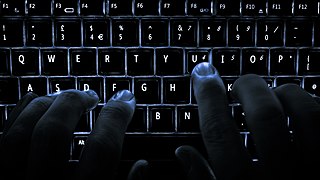Related Research Articles

Jonathan L. Zittrain is an American professor of Internet law and the George Bemis Professor of International Law at Harvard Law School. He is also a professor at the Harvard Kennedy School, a professor of computer science at the Harvard School of Engineering and Applied Sciences, and co-founder and director of Harvard's Berkman Klein Center for Internet & Society. Previously, Zittrain was Professor of Internet Governance and Regulation at the Oxford Internet Institute of the University of Oxford and visiting professor at the New York University School of Law and Stanford Law School. He is the author of The Future of the Internet and How to Stop It, as well as co-editor of the books, Access Denied, Access Controlled, and Access Contested.
This page provides an index of articles thought to be Internet or Web related topics.

Freedom of information is freedom of a person or people to publish and consume information. Access to information is the ability for an individual to seek, receive and impart information effectively. This sometimes includes "scientific, indigenous, and traditional knowledge; freedom of information, building of open knowledge resources, including open Internet and open standards, and open access and availability of data; preservation of digital heritage; respect for cultural and linguistic diversity, such as fostering access to local content in accessible languages; quality education for all, including lifelong and e-learning; diffusion of new media and information literacy and skills, and social inclusion online, including addressing inequalities based on skills, education, gender, age, race, ethnicity, and accessibility by those with disabilities; and the development of connectivity and affordable ICTs, including mobile, the Internet, and broadband infrastructures".
Center for Democracy & Technology (CDT) is a Washington, D.C.-based 501(c)(3) nonprofit organization whose mission is to strengthen individual rights and freedoms by defining, promoting, and influencing technology policy and the architecture of the Internet.

Internet privacy involves the right or mandate of personal privacy concerning the storing, repurposing, provision to third parties, and displaying of information pertaining to oneself via the Internet. Internet privacy is a subset of data privacy. Privacy concerns have been articulated from the beginnings of large-scale computer sharing.

Electronic Frontiers Australia Inc. (EFA) is a non-profit Australian national non-government organisation representing Internet users concerned with online liberties and rights. It has been vocal on the issue of Internet censorship in Australia.
The OpenNet Initiative (ONI) was a joint project whose goal was to monitor and report on internet filtering and surveillance practices by nations. The project employed a number of technical means, as well as an international network of investigators, to determine the extent and nature of government-run internet filtering programs. Participating academic institutions included the Citizen Lab at the Munk Centre for International Studies, University of Toronto; Berkman Center for Internet & Society at Harvard Law School; the Oxford Internet Institute (OII) at University of Oxford; and, The SecDev Group, which took over from the Advanced Network Research Group at the Cambridge Security Programme, University of Cambridge.
The Faculty of Law of the University of New South Wales is a law school situated in Sydney, Australia. It is widely regarded as being one of Australia's top law schools. In 2020, QS World University Rankings ranked the UNSW Law Faculty 14th the best in the world, and 3rd in Australia. It is ranked second in Australia according to the ARWU 2017 subject rankings and the 2020 Times Higher Education subject rankings.
The following outline is provided as an overview of and topical guide to the Internet.

Internet censorship is the control or suppression of what can be accessed, published, or viewed on the Internet enacted by regulators, or on their own initiative. Individuals and organizations may engage in self-censorship for moral, religious, or business reasons, to conform to societal norms, due to intimidation, or out of fear of legal or other consequences.
Internet censorship in the United States is the suppression of information published or viewed on the Internet in the United States. The First Amendment of the United States Constitution protects freedom of speech and expression against federal, state, and local government censorship.

Cyberethics is the philosophic study of ethics pertaining to computers, encompassing user behavior and what computers are programmed to do, and how this affects individuals and society. For years, various governments have enacted regulations while organizations have defined policies about cyberethics.
Information technology law concerns the law of information technology, including computing and the internet. It is related to legal informatics, and governs the digital dissemination of both (digitalized) information and software, information security and electronic commerce aspects and it has been described as "paper laws" for a "paperless environment". It raises specific issues of intellectual property in computing and online, contract law, privacy, freedom of expression, and jurisdiction.
Internet censorship circumvention is the use of various methods and tools to bypass internet censorship.
There were different but similar copyright bills in the 112th United States Congress: The Stop Online Piracy Act (SOPA) in the House of Representatives and the PROTECT IP Act (PIPA) in the Senate. A typical route for legislation like this is to pass some version in both houses, then refer the two bills to a conference committee, which would produce a single bill likely to pass both houses.
Information policy is the set of all public laws, regulations and policies that encourage, discourage, or regulate the creation, use, storage, access, and communication and dissemination of information. It thus encompasses any other decision-making practice with society-wide constitutive efforts that involve the flow of information and how it is processed.
Network sovereignty is the effort of a governing entity, such as a state, to create boundaries on a network and then exert a form of control, often in the form of law enforcement over such boundaries.
The child abuse image content URL list is a list of URLs and image hashes provided by the Internet Watch Foundation to its partners to enable the blocking of child pornography & criminally obscene adult content in the UK and by major international technology companies.
Human rights in cyberspace is a relatively new and uncharted area of law. The United Nations Human Rights Council (UNHRC) has stated that the freedoms of expression and information under Article 19(2) of the International Covenant on Civil and Political Rights (ICCPR) include the freedom to receive and communicate information, ideas and opinions through the Internet.
Internet universality is a concept and framework adopted by UNESCO in 2015 to summarize their positions on the Internet. The concept recognizes that "the Internet is much more than infrastructure and applications, it is a network of economic and social interactions and relationships, which has the potential to enable human rights, empower individuals and communities, and facilitate sustainable development. The concept is based on four principles stressing the Internet should be Human rights-based, Open, Accessible, and based on Multistakeholder participation. These have been abbreviated as the R-O-A-M principles. Understanding the Internet in this way helps to draw together different facets of Internet development, concerned with technology and public policy, rights and development."
References
- ↑ "Research Associates - Cyberspace Law and Policy Community". cyberlawcentre.org.
- ↑ "Internet filtering and censorship forum UNSW 27 November 2008 - Cyberspace Law and Policy Centre -". cyberlawcentre.org.
- ↑ "Internet filtering and censorship forum UNSW - Cyberspace Law and Policy Centre - Second UNSW Workshop 4 March 2009". cyberlawcentre.org.
- ↑ "Internet filtering and young people - Cyberspace Law and Policy Centre - UNSW research project on content regulation and censorship". cyberlawcentre.org.
- ↑ "Unlocking Intellectual Property". cyberlawcentre.org.
- ↑ "Unlocking Intellectual Property - Setting the Context". cyberlawcentre.org.
- ↑ "Unlocking Intellectual Property - Setting the Context". cyberlawcentre.org.
- ↑ "Unlocking Intellectual Property". www.cyberlawcentre.org.
- ↑ "Unlocking Intellectual Property - Setting the Context". www.cyberlawcentre.org.
- ↑ "Unlocking Intellectual Property - 2009". www.cyberlawcentre.org.
- ↑ "The House of Commons".
- ↑ "Unlocking Intellectual Property". www.cyberlawcentre.org.
- ↑ "XXX". www.cyberlawcentre.org.
- ↑ "Interpreting Privacy Principles - Publications". www.cyberlawcentre.org. 5 May 2008.
- ↑ "Asia Pacific Privacy Charter Council APPCC APEC". www.cyberlawcentre.org.
- ↑ "Unlocking Intellectual Property". www.cyberlawcentre.org.
- ↑ "XXX". www.cyberlawcentre.org. 9 May 2008.
- ↑ "Online Investing". cyberlawcentre.org.
- ↑ "Regulating Online Investing - About us". cyberlawcentre.org.
- ↑ "About". University of New South Wales. Allens Hub for Technology, Law & Innovation. Retrieved 15 July 2019.